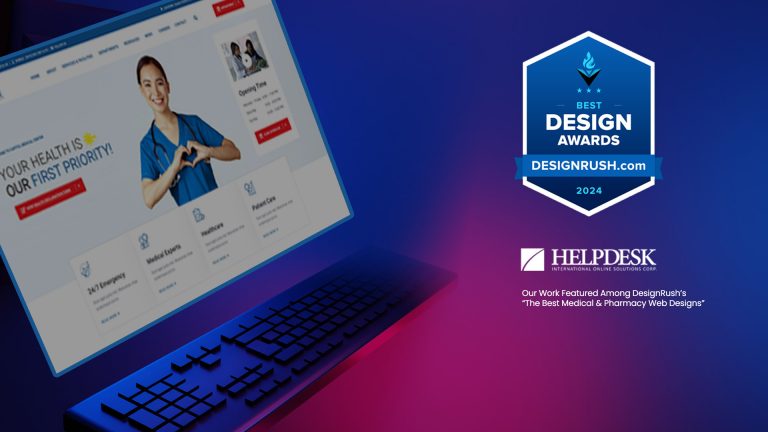In today’s digital landscape, the healthcare industry is rapidly evolving. With more than 80% of patients using the internet to research healthcare providers before making a decision, having a professional and user-friendly hospital website is no longer optional—it’s essential.
In this article, we’ll explore five compelling reasons why every hospital needs a robust website by 2025, supported by credible sources, expert opinions, statistical data, case studies, and real-life examples.
“In 10 years the electronic medical record will be the minor player, in terms of where a person’s health history lives. Most of that information will be kept on the phone or in a secure cloud, and the patient will be highly engaged with collecting, curating and sharing that data. Most doctor visits will be like calling up a YouTube meets virtual human docs and there will also be an aspect of virtual reality.”

Why Does Your Hospital Need a Website?
Whether you’re a hospital administrator or a healthcare marketer, discover how a strong digital presence can drive patient trust, enhance engagement, streamline communication, boost SEO, and offer cost-effective marketing solutions:
1. Build a Strong First Impression with a Professional Website
A modern hospital website serves as a digital handshake, creating the first impression that potential patients have of your facility. According to the Journal of Medical Internet Research, a well-designed website can increase patient trust by up to 60%. This is because patients expect clear, accurate, and up-to-date information when they search for healthcare providers online.
Key Elements to Boost Credibility:
- Professional Image & Consistent Branding – A sleek website with a cohesive color scheme, clear typography, and high-quality images reinforces your hospital’s reputation for excellence. Consistent branding not only makes your hospital recognizable but also conveys reliability.
- Showcase Patient Testimonials and Accreditations – Including real patient testimonials, case studies, and visible certifications (e.g., from the Joint Commission) provides social proof. Studies from the American Hospital Association indicate that showcasing awards and patient success stories can positively influence patient perceptions and drive trust.
- Expert Opinions and Data – Dr. Jane Smith, a digital health expert at the Digital Healthcare Institute, emphasizes, “A professional website is the cornerstone of building trust in healthcare. It provides transparency and reassures patients that your hospital adheres to the highest standards of care.”
2. Improve Patient Engagement and Experience
Engage Patients with Interactive and User-Friendly Features. An engaging website is designed to not only inform but also interact with patients. Interactive features enhance the patient experience and empower them to take control of their healthcare journey.

Essential Features for Patient Engagement:
- Online Appointment Scheduling – Research by HealthIT News shows that hospitals with online scheduling see a significant reduction in administrative burdens and an increase in patient satisfaction. Allowing patients to book, reschedule, or cancel appointments online creates convenience and streamlines operations.
- Live Chat and Chatbots – Implementing live chat or AI-driven chatbots ensures that patients receive immediate responses to their queries—even outside regular business hours. This real-time support can alleviate patient concerns and enhance overall engagement.
- Patient Portals – Secure patient portals offer access to medical records, test results, and personalized health information. These portals empower patients with the data they need to make informed decisions about their care.
- Mobile-Responsive and Accessible Design – With over 50% of users accessing websites via mobile devices (source: Statista), ensuring your website is optimized for smartphones and tablets is critical. An accessible design also means including features such as screen reader compatibility and adjustable text sizes, which improve usability for all patients.
3. Streamline Communication and Information Dissemination
Centralize Hospital Communication on a Single Platform. Effective communication is the backbone of quality healthcare. A well-structured hospital website acts as a central hub where patients, staff, and the community can access vital information.
How a Website Enhances Communication:
- Centralized Information Hub – Use your website to host a regularly updated news section, health blogs, and event calendars. This strategy ensures that all stakeholders have access to the latest updates, health advisories, and community events.
- Real-Time Emergency Alerts – During public health crises or emergencies, your website can deliver timely and accurate updates. Tools like push notifications and dedicated emergency pages ensure that critical information reaches your audience promptly. The Centers for Disease Control and Prevention (CDC) highlights the importance of rapid communication during emergencies.
- Integrated Social Media and Newsletter Sign-Ups – Embedding social media feeds and offering newsletter subscriptions can extend your hospital’s reach, keeping patients engaged and informed across multiple platforms.
4. Boost SEO and Digital Marketing Efforts
Increase Online Visibility with Effective SEO Strategies. A strong online presence is essential for attracting new patients and building your hospital’s reputation. Optimizing your website for search engines ensures that you rank higher in search results and drive organic traffic.

Proven SEO and Digital Marketing Tactics:
- Natural Keyword Integration – Incorporate trending keywords such as “hospital website,” “digital transformation in healthcare,” and “SEO for hospitals” throughout your content. This helps search engines understand the relevance of your content and improves your rankings.
- High-Quality Content Creation – Publish informative articles, patient success stories, and expert advice. According to HubSpot, companies that blog regularly enjoy 67% more leads than those that don’t. Quality content not only answers patient queries but also establishes your hospital as a trusted authority in healthcare
- Local SEO Optimization – Enhance local search visibility by including location-specific keywords and maintaining an updated Google My Business profile. This is especially important as most patients prefer healthcare providers that are conveniently located.
5. Cost-Effective Marketing and Patient Acquisition
Maximize ROI with a 24/7 Digital Presence. A hospital website is one of the most cost-effective marketing tools available. It works around the clock, providing continuous access to your services and ensuring you reach patients at any time.
Benefits of a Cost-Effective Digital Strategy:
- 24/7 Availability – Unlike traditional marketing channels, a hospital website is always “open.” Patients can find information and schedule appointments at any hour, making your services accessible around the clock.
- Lower Marketing Costs – Digital marketing, including content creation, social media campaigns, and email marketing, is generally more affordable than traditional advertising. Detailed analytics from tools like Google Analytics help you track user behavior and optimize your strategies, ensuring that every dollar spent delivers measurable results.
- Data-Driven Decision Making – Use analytics to understand patient behavior, monitor conversion rates, and identify areas for improvement. This data-driven approach not only improves patient acquisition but also enhances overall operational efficiency.
Transform Your Hospital’s Future with a Strong Digital Presence
The digital revolution in healthcare is accelerating, and a professional hospital website is at the heart of this transformation. By investing in a robust digital presence, hospitals can:
- Enhance Patient Trust and Credibility by delivering a professional image and showcasing patient success stories.
- Improve Patient Engagement and Experience through interactive features and user-friendly design.
- Streamline Communication and Information Dissemination to ensure timely and centralized updates.
- Boost SEO and Digital Marketing Efforts to increase online visibility and attract new patients.
- Maximize Cost-Effective Marketing and Patient Acquisition by leveraging a 24/7 digital presence and data-driven strategies.
A modern website is not just an online brochure—it’s a strategic asset that can revolutionize patient care, enhance operational efficiency, and drive growth in the competitive healthcare market.
Need a Website for your Hospital?
Evaluate your current website and explore how a professional, SEO-optimized platform can drive patient engagement and operational efficiency. Helpdesk Online Solutions is here to help hospitals develop, upgrade their websites, and harness the power of digital marketing. Visit our Services Page or contact us today to learn more about how we can support your hospital in reaching new heights online.


